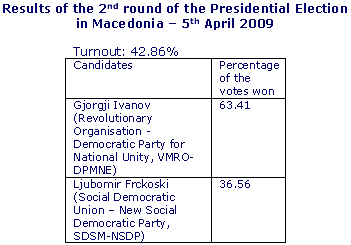Results
News
Corinne Deloy,
Fondation Robert Schuman,
Helen Levy
-

Available versions :
EN

Corinne Deloy
Fondation Robert Schuman
Helen Levy
The candidate of the party of present Prime Minister Nikola Gruevski – the Revolutionary Organisation-Democratic Party for National Unity (VMRO-DPMNE) – Gjorgji Ivanov, won the second round of the presidential election on 5th April in Macedonia. According to incomplete results that cover 97% of the polling stations he is said to have won 63.41% of the vote, with 36.65% going to his rival Ljubomir Frckoski, former Interior and Foreign Affairs Minister who has the support of the main opposition parties, the Social Democratic Union (SDSM) and the New Social Democratic Party (NSDP).
Turnout rose to 42.86%, i.e. -14.02 points less in comparison with the first round on 22nd March but above the obligatory 40% threshold for the election to be deemed valid. The Albanian speaking population which represents one quarter of the country's electorate and none of whose candidates qualified for the second round partly boycotted the urns.
On 5th April Macedonians also elected their local representatives in 43 of the country's towns including Skopje.
The victory of the VMRO-DPMNE candidate was expected. None of the unfortunate candidates in the first round gave voting instructions for 5th April.
Between rounds the electoral campaign was dominated by the argument over the official name to be given to the country which is preventing the country's entry into NATO, since Greece is refusing for Macedonia to call itself "Yugoslav Republic of Macedonia" because it would be a possible territorial claim over the Greek province bearing the same name.
Gjorgji Ivanov called on Macedonians to defend their name whilst Ljubomir Frckoski spoke in favour of a compromise with Greece, a position that has the EU's and the USA's support. According to the opposition candidate EU and NATO membership must be the country's priority in terms of foreign policy and Macedonia must not run the risk of being excluded from both organisations because of an intransigent position it adopts over its name. Gjorgji Ivanov, like Prime Minister Nikola Gruevski, is refusing any change in name that might endanger the nation's unity. "Macedonia now faces three vital priorities, which are integration into the EU, NATO and the settlement of the question of the country's name which has opposed Skopje and Athens for the last 18 years," declared Gjorgji Ivanov. "Our first task will be to settle the issue of the country's name with our southern neighbour Greece," he stressed, adding, "I am sure that we can find an agreement and a compromise."
The second round of the presidential election took place without any major incident. The international community made the transparent, democratic nature of the vote the main stake in this election. The EU recalled that the democratic nature of the presidential election was a key element in the possible opening of accession negotiations with Macedonia, an official candidate since 2005. "This election is part of the road to the EU" said European Enlargement Commissioner, Olli Rehn. The Macedonian authorities insisted on avoiding a repetition of the events that took place during the general elections on June 1st 2008. More than 500 foreign observers (524) and around 7000 local observers (6,981) monitored the second round of this presidential election for which additional police forces had been called out (2,000 extra policemen). "We showed that we could undertake elections European style, ie peaceful, democratic and without violence," said Gjorgji Ivanov.
In Macedonia the presidential function is mainly honorary. However the election of Gjorgji Ivanov puts an end to a period of tension between the Head of State and the Prime Minister which had typified the cohabitation between outgoing President Branko Crvenkovski (SDSM) and the present Prime Minister Nikola Gruevski.
 Source: Agence France Presse
Source: Agence France PresseOn the same theme
To go further
Elections in Europe
Helen Levy
—
24 February 2026
Elections in Europe
Helen Levy
—
10 February 2026
Elections in Europe
Corinne Deloy
—
20 January 2026
Elections in Europe
Corinne Deloy
—
13 January 2026

The Letter
Schuman
European news of the week
Unique in its genre, with its 200,000 subscribers and its editions in 6 languages (French, English, German, Spanish, Polish and Ukrainian), it has brought to you, for 15 years, a summary of European news, more needed now than ever
Versions :


